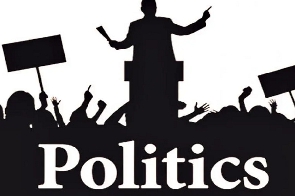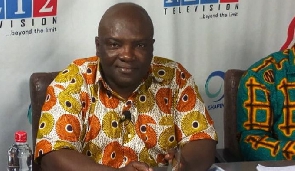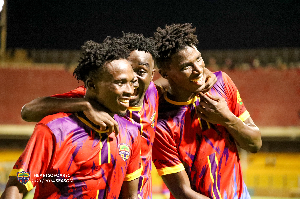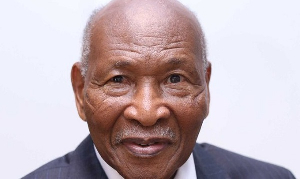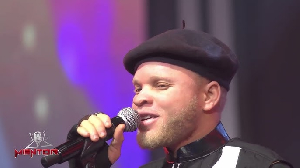Opinions of Thursday, 16 November 2023
Columnist: Ajoa Yeboah-Afari
Showdown, tweaa, skirt and blouse voting and more: let’s celebrate Ghanaian political humour!
Reference is often made to the commendable Ghanaian sense of humour, and probably our proverbial resilience – a word cited a number of times by Finance Minister Mr Ken Ofori-Atta when he presented the 2024 budget in Parliament on November 15 – may stem from that ability to see the funny side of every situation.
It has been illustrated recently by the advent of the now famous ‘showdown’ term, clearly inadvertently introduced into the Ghanaian political space by Kennedy Agyapong during his campaign to win the presidential slot of the ruling New Patriotic Party.
The background was a video from the Central Region that went viral on August 26, 2023, during the NPP’s Super Delegates Conference. Mr Agyapong, MP for Assin Central, was heard threatening, in a phone call, to give President Nana Akufo-Addo and Vice President Alhaji Dr Mahamudu Bawumia “a showdown”. The reason for his anger was because of reports that his agent in the North East Constituency had been attacked by other NPP members, believed to be Bawumia team members.
Later, Mr Agyapong’s campaign team clarified what Mr Agyapong had meant by the “showdown” explaining that it had not been a threat to President Akufo-Addo and Dr Bawumia.
At a press conference, Mr Agyapong’s campaign manager, Kwame Owusu, said that the expression was only used to indicate that Agyapong would win the November 4 polls, regardless of any moves against him.
Anyhow, it wasn’t Dr Bawumia who was given a showdown, as he won with 61.43 percent of the votes; Mr Agyapong – 37.42; Dr Owusu Afriyie Akoto – 0.75 and Mr Francis Addai Nimoh – 0.41.
Not surprisingly, wordsmiths, have been thinking about ‘showdown’, including my senior colleague Mr I.K. Gyasi and he has shared his findings with me. Excerpts:
“SHOWDOWN"
“My immediate interest is not in the person who used it or in the politics of it. My interest is purely linguistic. What is the meaning of the word?
“1. an important argument that is intended to end a disagreement that has existed for a long time.
(Cambridge Dictionary).
“2. an argument, a fight, or a test that will settle a disagreement that has lasted a long time
(Oxford English Dictionary), and;
“3. a big argument or conflict which is intended to settle a dispute that has lasted for a long time
(Collins Dictionary).
Interestingly, Mr Agyapong’s furious ‘showdown’ threat has now seemingly been adopted by the public as a ‘comic relief’ expression, added to not only the NPP’s, but the general Ghanaian political and social lexicon! It’s now also a regular in headlines.
Well, it’s in good company with other comic relief terms, such as ‘Who said tweaa!?’ and ‘Fear delegates’.
The WHO SAID ‘TWEAA’? story:
Gabriel Barima a former National Democratic Congress District Chief Executive of the Ahafo Ano South District in the Ashanti Region, is well known for popularising the Akan word ‘tweaa’ – used to indicate scornful, rude disagreement.
In January, 2014, the fury of Mr Barima was captured on video when an unidentified person exclaimed “tweaa!” while he was giving an address at a forum at the Mankranso Hospital.
A summary of his outburst: “Who said ‘tweaa’? I have been given the platform to talk. You were not given the platform to talk. … Am I your colleague? ...You sit somewhere and behave like you're talking to your co-equal. Am I your co-equal?”
Needless to say, “who said tweaa?” and “am I your co-equal?” quickly became favourite banter phrases in the country. Indeed, at a point, tweaa was in such popular use, even in Ghana’s Parliament, as a heckling weapon, that on February 18, 2014, the then Speaker, Mr Doe Adjaho was compelled to take the unprecedented step of banning use of that word in the chamber altogether.
FEAR DELEGATES:
Undoubtedly, the copyright of “fear delegates” – derived from the Akan adage ‘fear your fellow human beings, instead of fearing ghosts’ - belongs to the late former General Secretary of the NPP, Kwadwo Owusu Afriyie, better known as ‘Sir John’.
At the NPP’s 2014 conference in Tamale, Sir John lost his position despite the high expectation that he would retain it. Shocked by the outcome, he summed up his defeat in the now immortal words. Sir John told a radio station that apart from death, there could be no other wicked personalities on this earth than delegates. “Fear delegates, not ghosts.” (Ghanaian Chronicle, April 19, 2014.)
However, long before the above ‘duo’, there was an earlier display of wit in the then intimidating political arena, defusing what was clearly meant as an ominous warning. I’m referring to the classic response by industrialist Akenten Appiah-Menka to the ‘fatwa’ against his Apino soap by President Jerry Rawlings.
In 1993, in an aggressive speech to mark the June 4 Revolution, President Jerry John Rawlings urged Ghanaians not to buy Apino soap, manufactured in Kumasi by a factory owned by NPP stalwart Mr Appiah-Menka. Patronising Apino soap would be providing funds to the opposition NPP, so people should boycott it, President Rawlings said.
As I recall, a few days after that ominous presidential edict, there was a change in the regular Apino newspaper advert, a brief, cheeky line which said something like: “Buy Apino soap, the soap presidents talk about”.
However, the riposte was short-lived, and my suspicion is that Mr Appiah-Menka was advised that President Rawlings would not find it amusing – and that there might be consequences.
Anyhow, that strange Rawlings directive seems to have backfired, as protest buyers now looked for Apino soap to buy, in solidarity with the Apino manufacturer and indigenous business. Memorably, later it emerged that one of those protest buyers, was none other than the mother of then Finance Minister, Dr Kwesi Botchwey!
As reported by West Africa magazine, speaking at a conference in London soon after the June 4 order against Apino soap, Dr Botchwey said that to his surprise his mother asked him about Apino soap – and then went and bought some.
SKIRT AND BLOUSE VOTING
And it wouldn’t surprise me if that curious expression, ‘skirt and blouse voting’ is found to be a Ghanaian creation. It refers to voting for a Presidential candidate of one party, but voting for a parliamentary candidate of a different party.
Of course it illustrates the phenomenon perfectly, but the odd thing is that in reality, in the fashion world, a skirt and blouse outfit can be of the same fabric, not necessarily of different fabrics or colour!
Still, it’s a term that apparently all the different political actors are comfortable with, in the same way that ‘showdown’ appears to be a universal favourite.
Nevertheless, regrettably, it’s not always that all sides of the political divide see the amusing side of things, as was recently illustrated when President Akufo-Addo paid a visit to the victims of the Akosombo Dam spillage. At Mepe, Volta Region, a joke the President made, generated some controversy as some people saw it as an insensitive comment.
What President Akufo-Addo said: “Togbe, I want the people here … to understand that when something like this happens and Government acts, Government is acting for Ghanaians, for all Ghanaians.
“I came here because Ghanaians are suffering, and it is my responsibility to try and help. Because, if it is a question of counting who votes for me and who doesn't vote for me, then I shouldn't be here; because you don't vote for me. But that is not my concern. And, in any event, one day you will vote for me and my party.”
Watching the video of the meeting, I noted that the audience appeared to be enjoying the President’s light-hearted comment about their voting pattern and there was spontaneous laughter. However, critics lambasted the President for his comments. An unfortunate interpretation, especially as the people the President was addressing appeared to have seen the joke.
But the queen mother of Mepe was one of the people who understood the President’s humour, describing it as a “harmless joke”.
Class FM reported that “the Queen Mother of the Mepe Traditional Area, Mamaga Adzo Srako IV, however, sees things differently. She was in the audience when the President spoke and she has mounted what seems like a defence for him, arguing there are weightier issues to spotlight.”
She said: “The president made promises; that immediately he’ll see to us, and (also) in the long term.
“However, the little joke the President (made), that if it were because of votes, he would not have come here, has rather become the news,” she lamented.
“That’s what you (the media) are circulating instead of (highlighting) the disaster that has befallen us. You chose to rather make a big deal out of the harmless joke by the president.
“We were not pleased with you journalists,” Mamaga Srako said.
If only politics in Ghana could be less confrontational, more conciliatory- especially among the foot soldiers! Nevertheless, ‘showdown’, seems to be popular with all.
Notably, after the November 4 declaration of Dr Bawumia as the elected NPP flagbearer, Mr Agyapong ended his concession remarks with the announcement that bearing in mind the 2024 general election, the ‘showdown’ is “now being transferred to the NDC”.
And no surprise that it even showed up in Parliament too, at the budget presentation. In his concluding remarks after the session, Speaker Mr Alban Bagbin said: “I’m not going to do any showdown,” adding that the showdown man is his friend, prompting laughter on both sides of the House.
With so much animosity in our political space, I think we need all the humour we can get, all the laughter we can share. So a toast to the Ghanaian political humorists; let’s celebrate Ghanaian political humour.

